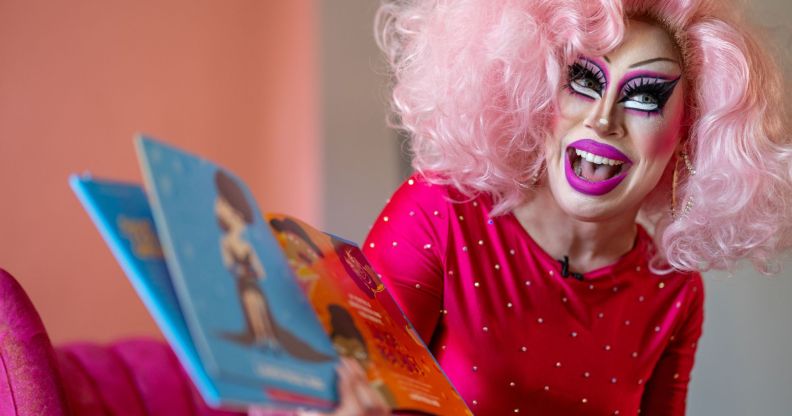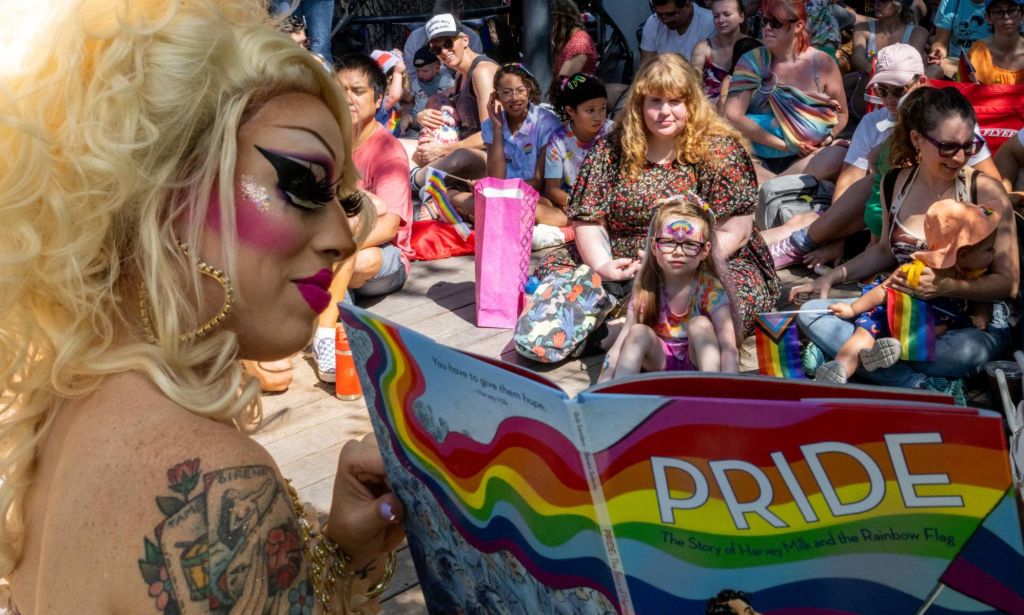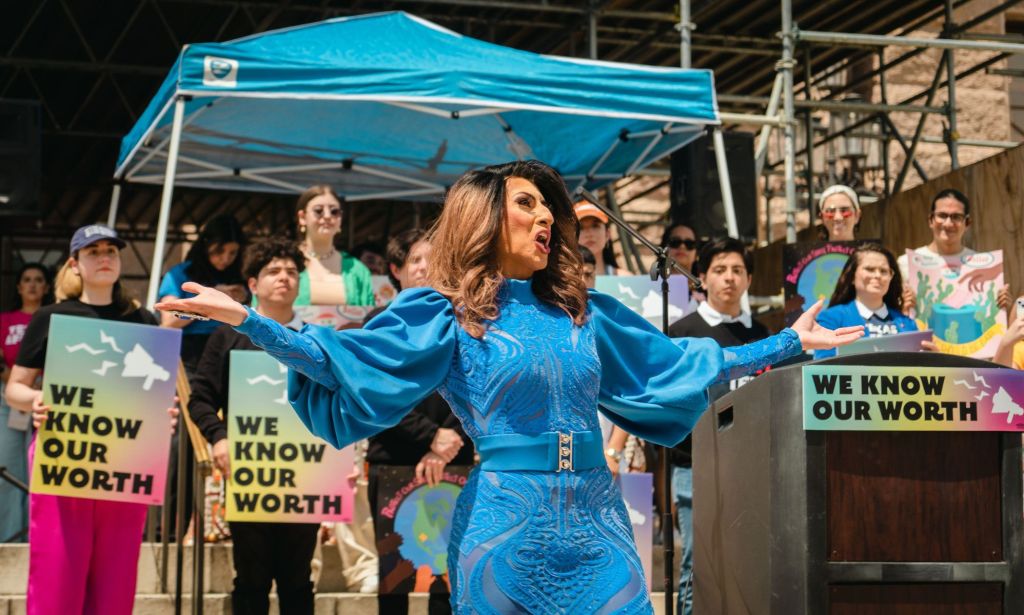Texas drag ban: ‘I never dreamed I’d be in court fighting for the right to wear make-up and a wig’

Brigitte Bandit (Getty)
When Brigitte Bandit began performing in drag, she saw the joy it could bring people. Now, five years later, the Texas artist is astounded to find herself in court fighting for other performers and LGBTQ+ people.
Bandit went viral in April after taking on anti-drag legislation in Texas that threatened her livelihood and those of her fellow queens – all while wearing a huge pink wig, a floor-length pink gown and exaggerated eye makeup.
Just a few weeks later, the Austin-based queen testified before a House committee in a dress bearing the names of the victims of the Uvalde and Allen mass shootings in Texas, to argue that the real danger facing children is gun violence, not drag.
She was escorted out of the hearing by police.
Last week, Bandit took a stand for her fellow performers once again when she joined a legal case opposing Senate Bill 12, an anti-drag measure signed into law by Texas governor Greg Abbott in June.
For Bandit, the drag ban battle – from the political sphere to the courts – is crucial because inaccurate rhetoric against the drag and LGBTQ+ communities has grown in recent years, and it’s “causing a lot of real violence and harm” that’s spread from Texas’ borders to the rest of the world.
“It is happening in a lot of other states and even now outside of this country, which is just sad,” she tells PinkNews. “I would have never imagined that this is what our lawmakers would be spending time on.
“When I started drag, I would have never imagined this is where my career would take me, fighting for the rights of us, just to f**king wear some makeup and a wig, fighting especially for the protection of trans people right now.
“You see a lot of increased violence against trans people and it’s scary. It’s scary just being visibly queer right now.
“[During] the pandemic, I used to perform in front of people’s houses, in front of their lawns and the whole street.
“The neighbourhood would come out and they would be so excited because we were all locked in. We could do socially distance performing. I can’t do that any more.”

On 31 August, a federal judge issued a temporary injunction in a lawsuit involving Bandit, several LGBTQ+ organisations and drag businesses regarding Senate Bill 12.
The law, which was scheduled to take effect from the start of this month, would penalise businesses with a $10,000 (£8,000) fine for hosting so-called “sexually oriented performances”. Performers could be charged with a Class A misdemeanour, punishable by up to a year in jail and a $4,000 (£3,200) fine.
While the bill’s wording doesn’t specifically mention drag, local politicians, including Abbott and lieutenant governor Dan Patrick, have made it clear the legislation iss intended to restrict drag performances in the Lone Star State.
Bandit says the law is “clearly rooted in transphobia” and misogyny because right-wing pundits believe the “only reason anybody would want to dress to look like a woman is to be sexualised”.
‘White, Christian, cis, hetero ideas’
It’s also using LGBTQ+ people and drag artists as a “scapegoat for the real f**king issues that y’all want to ignore”, she recalls saying.
“It’s f**king scary times we’re living in right now, and it’s just wild that they sit there and claim they care about kids.
“They also love this idea of parental choice. But you won’t allow a parent to decide what kind of entertainment is good for their kids.
“You don’t allow a parent to decide what kind of healthcare is proper for their kids.
“It’s not about parental choice. It’s not about protecting children. It’s about harming a group of people and making them seem like something they’re not.
“They have one idea of what is proper and right, and it’s based in very white, Christian, cis, hetero ideas and it’s causing a lot of violence and harm, and you ignore the real issues and the real predators – the actual people who are harming kids.”
Bandit and other drag artists have been the target of threats, anti-LGBTQ+ rhetoric and hateful legislation championed by conservative groups as well as politicians in her home state.
It’s emboldened hate groups to attack and threaten artists and LGBTQ-friendly businesses too.
Texas’ drag ban is part of a larger attack on LGBTQ+ rights in the state
Texas is at the epicentre of a tidal wave of anti-LGBTQ+ and anti-trans legislation in the US. Conservative politicians attacked trans youth last year with bills that restrict life-saving gender-affirming healthcare and ban trans student athletes from participating in teams that align with their gender identity.
Right-wing pundits have raged at the inclusion of LGBTQ+ books in local libraries and officials have vowed to introduce a bill like Florida’s Don’t Say Gay law that would keep discussions of queer identities out of schools.

In February 2022, Abbott issued a directive ordering state officials to investigate parents who provide medically necessary gender-affirming care to their trans kids.
The investigation has haunted the families involved. Parents, advocates, celebrities and medical professionals rallied against the order and fought it all the way to the state’s Supreme Court.
Kerry Lynn, founder and creative services director of Extragrams, was also part of the lawsuit challenging Texas’ anti-drag legislation.
For three years, her drag queen telegram and entertainment delivery service has brought “sheer joy” to corporate events, weddings and bachelorette parties. She says the majority of people love the performances.
And it’s hammered home that those fighting against drag and LGBTQ+ rights are part of what Lynn calls a loud, hateful minority.
“Although I think we have our work and fight cut out for us, I am very hopeful for the future,” she says.
“Drag is too big, too fabulous, too out there, and people want it. You can’t hold that back.”
She has seen the “power of this community getting together” to fight legislation and knows they will “continue to show these lawmakers that [they] will not go down quietly”.

She adds: “Regardless of what happens in the next two weeks about this law, the dangers of this law in public – these are residual effects that we’re going to be dealing with, drag performers are gonna be dealing with for such a long time, and it’s heart-breaking.
“When the governor says something about ‘banning drag in public’, signs a law and tweets that, that is targeting an entire group of people. That’s incredibly dangerous in what you’re communicating to your state.
“Our fight is to continue to show up, to continue to share content, to show up in trial, to show up in life and show people that this is a really beautiful, fabulous art form.”
Lawmakers in more than a dozen states, including Nebraska, North Dakota and South Carolina, have also proposed laws to ban drag in public or performances in front of people under the age of 18.
Tennessee’s drag ban law was used, unsuccessfully, by politicians to attack Pride events in the state.

